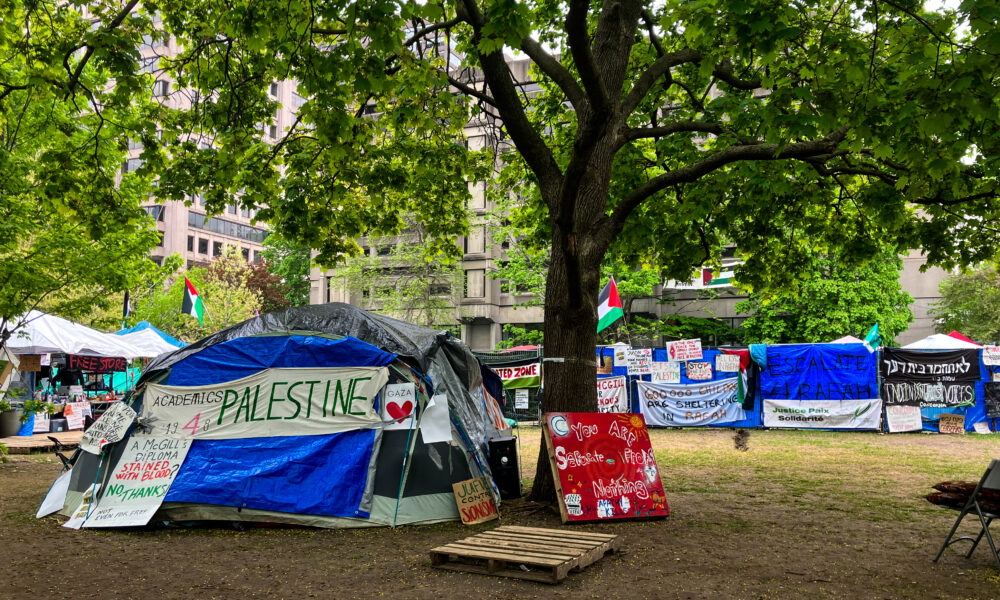On May 15, the Superior Court of Québec rejected an injunction request put forth by McGill University to dismantle the encampment on the lower field of campus. The encampment—which has been in place since April 27—was established by students from McGill, Concordia University, and Université du Québec à Montréal (UQÀM) to pressure their respective universities to disclose and divest from financial ties to companies complicit in the Israeli genocide of Palestinians. They also demand that the universities condemn the siege on Gaza, compel the Canadian state to cease military contracts with Israel, and protect students from disciplinary action related to protesting.
Solidarity for Palestinian Human Rights (SPHR) at McGill is one of the student groups involved in organizing the encampment. A representative from SPHR, who wished to be unnamed, told The Tribune that the court’s decision is a “huge victory” for the movement.
“The injunction was rejected by the court for, you know, a different amount of reasons,” they said in an interview on May 15. “One of the outlined considerations was that this is part of a broader student movement in North America that is protesting the ongoing genocide. So this is a huge victory as a legal precedent, and for the student movement, of course, but this is also the second injunction that is rejected.”
The May 15 decision comes fourteen days after Justice Chantal Masse rejected a separate injunction request submitted by two McGill students, which had also asked for the encampment to be removed.
In a statement released on May 10, McGill President Deep Saini outlined McGill’s main reasons for submitting the injunction request. He stressed the alleged health and safety risks associated with encampment, claiming that the encampment appears to lack fire escape routes and blocks an emergency exit from McLennan-Redpath Library Building. He went on to state that “[t]he encampment has the potential to create unsafe situations unpredictably” by bringing counter-protesters to campus, citing May 2 counter-protests which resulted in the temporary closure of Roddick Gates and police presence on campus.
Saini also expressed that the encampment will likely force McGill to move convocation to a new venue, rather than take place on lower field. The move will cost an additional $700,000, according to McGill’s injunction request. In his decision, Justice Marc St-Pierre stated that McGill had already selected another location for convocation.
A representative from SPHR at McGill denied that the encampment was unsafe in a May 15 press conference, explaining that there are professionals in the encampment who are ensuring the health and safety of students. The representative did not further elaborate on this matter.
The representative also repeated their commitment to staying at the encampment until their demands are met.
“Our administration has not come back with any concrete proposal that meets our demands in a material way,” they said. “Instead, they decided to spend hundreds of thousands of dollars pursuing their students in a legal case that has failed.”
The McGill Media Relations Office reiterated in a statement on May 17 that the university respects students’ rights to protest as long as they do not violate McGill policies and the law. The Office also stressed its commitment to negotiate fairly with student protesters.
“Throughout this process, we have remained open to dialogue, having met six times with representatives of the McGill community involved in the encampment between May 3 and 10,” the Office wrote. “We are committed to continuing these discussions in good faith, in hopes that this engagement may lead to a solution.”
McGill will also be seeking an interlocutory injunction to end the “indefinite encampment on its property.” The McGill Media Relations Office stressed in a May 22 email to The Tribune that this request does not seek to ban protests on campus, but to remove the encampment.
On May 12, UQÀM students created an encampment on their campus, demanding that their university and all universities in Quebec adopt a policy of academic boycott against Israeli institutions complicit in the colonization of Palestine. A representative from Solidarité Palestine (SDHPP) à UQÀM, who wished to remain unnamed, explained that the UQÀM encampment was established both to pursue their demands of their university, and in response to the risk of removal that the McGill’s injunction request placed on the encampment there.
The representative also spoke to the knowledge they gained from the way that organizers of the encampment at McGill had approached cultivating relationships with internal members, the wider Montreal community, and the university administration. They noted that negotiating with the university, handling communications, and taking care of community members were among the responsibilities they had to learn how to facilitate as organizers of the encampment.
A representative from SPHR at McGill echoed the importance of community engagement at the encampment. They went on to attest to the way the encampment acts as a site of community-building for people across ages and backgrounds, detailing a new library and free store for members to use.
“We have essentially turned our university campus into a place of resistance, of collective knowledge,” the representative said. “This is what the library and all of these different infrastructures symbolize, it’s us reclaiming [the space] and making it a place for the community, in the absence of a space where you can speak about Palestine, and where you can mourn and grieve, but also fight for liberation.”
A graduate student at McGill, who wished to be unnamed, was among the supporters present near the encampment on the afternoon of May 15. In an interview with The Tribune, they criticized McGill for its failure to negotiate fairly with students and urged the university to listen to protesters.
“The students are clear, the demands are clear, and it’s very concise, and to the point, they just want McGill to divest,” they said, “After the [injunction was rejected in court,] it’s all about McGill now listening to the students and negotiating in good faith.”







